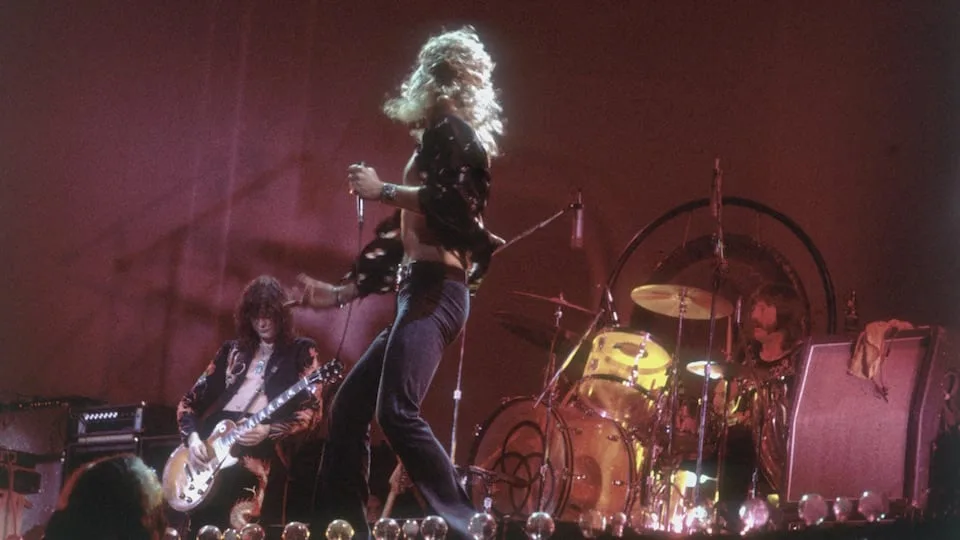
“A Song That Soared Above the Rest: Revisiting Zeppelin’s 1971 Masterpiece That Redefined Rock”
By [Author Name]
Published: April 19, 2025
“This is Zeppelin’s all-time classic and undoubtedly one of the finest tracks by any group this year.” — NME, November 1971
With those few, yet powerful words, New Musical Express (NME) in November 1971 captured the seismic impact of what has since become one of the most revered rock songs in history. The track in question? Led Zeppelin’s magnum opus: “Stairway to Heaven.” More than five decades on, the song continues to enchant listeners, inspire generations of musicians, and define an era of artistic ambition and sonic experimentation.
Released as part of their untitled fourth album—commonly referred to as Led Zeppelin IV—“Stairway to Heaven” was not just a song, but a movement. It was an emotional journey cloaked in mystery, fueled by haunting lyricism, and carried by a masterclass in musical arrangement. And in the waning months of 1971, it became apparent that the track wasn’t just another entry in Zeppelin’s already formidable catalog. It was the entry.
A Track Like No Other
What made “Stairway to Heaven” so revolutionary? For starters, its structure defied all conventional song forms of the time. In an era when radio hits typically capped at three minutes, Led Zeppelin dared to deliver a near-eight-minute epic that built gradually from a pastoral folk ballad into a full-blown hard rock crescendo. The song’s dynamic progression was more akin to a classical composition than a traditional rock number.
The delicate introduction, anchored by Jimmy Page’s finger-picked acoustic guitar and John Paul Jones’s ethereal recorder melodies, was a stark contrast to the heavy blues-rock Zeppelin was known for. Robert Plant’s vocals begin almost in a whisper, delivering cryptic lyrics that would become the subject of debate and interpretation for decades to come. As the track unfolds, each section becomes more intense, more layered—until it erupts into Page’s now-legendary guitar solo, often hailed as one of the greatest ever recorded.
The NME Quote That Captured a Moment
When NME published their November 1971 issue, their declaration that “This is Zeppelin’s all-time classic” was not hyperbole—it was a prophecy. At the time, the music world was in flux. The psychedelic haze of the late ’60s was fading, and bands were redefining what rock music could be. In that moment of transition, “Stairway to Heaven” stood tall—a beacon of musical maturity and creative ambition.
Calling it “undoubtedly one of the finest tracks by any group this year” was a bold statement, given that 1971 also saw the release of classic albums like Who’s Next by The Who, Hunky Dory by David Bowie, Sticky Fingers by The Rolling Stones, and What’s Going On by Marvin Gaye. But in retrospect, NME’s proclamation feels not only justified—it feels prophetic.
Recording Brilliance
The track was recorded at Island Studios in London and Headley Grange, a remote Victorian-era house in Hampshire, England, where the band often retreated to write and record. The remote setting and use of the Rolling Stones’ mobile studio gave the band freedom to experiment without time constraints or commercial pressure.
Jimmy Page, serving as producer, meticulously crafted the soundscape. The guitar tones were layered with care, and Page used a Fender Telecaster—given to him by Jeff Beck—for the solo. John Bonham’s drums, which enter only midway through the track, were recorded with such natural reverb and power that even today, producers try to emulate their thunderous presence.
Robert Plant’s lyrics were equally enigmatic. Drawing from mythological themes and the countercultural quest for spiritual enlightenment, lines like “There’s a lady who’s sure all that glitters is gold / And she’s buying a stairway to heaven” have inspired countless interpretations. Plant himself has acknowledged that the song was written in a stream-of-consciousness style, and has often resisted providing a definitive meaning—adding to its allure.
A Cultural Milestone
Despite never being released as a single in the U.K. or U.S., “Stairway to Heaven” became one of the most requested songs on FM radio during the 1970s. It was a slow-burn success, gaining traction through word-of-mouth and live performances. Led Zeppelin’s decision to keep the song off singles charts meant that fans had to purchase the full album—a move that helped Led Zeppelin IV sell over 37 million copies worldwide.
Over the years, the song has become more than just a rock anthem—it’s become a cultural touchstone. From high school guitar recitals to classic rock radio, from parodies to lawsuits, “Stairway to Heaven” is ever-present. It has been both adored and dissected, copied and criticized, yet it remains untouchable in its impact.
In 2004, Rolling Stone placed it at No. 31 on its list of “The 500 Greatest Songs of All Time.” In 2014, a legal battle over the opening chords—allegedly resembling Spirit’s “Taurus”—brought the song back into the headlines. Yet each time the song is scrutinized or debated, it only reaffirms its place in the pantheon of musical greatness.
Legacy and Influence
The true measure of “Stairway to Heaven” lies in its enduring influence. It’s been covered by countless artists, from Heart to Rodrigo y Gabriela, and featured in films, television, and countless classic rock compilations. Its crescendo-building structure has inspired countless imitators, though few have matched its grace.
Robert Plant, for all his ambivalence about revisiting past glories, has called the song “a wonderful piece of music,” though he’s also distanced himself from the epic over the years. In contrast, Jimmy Page remains proud of the track’s legacy, often defending its originality and celebrating its ongoing impact.
In 2007, during the band’s one-off reunion concert at London’s O2 Arena, “Stairway to Heaven” was met with thunderous applause—its opening notes still able to stir emotions across generations. For many in the audience, it was not just a song, but a rite of passage, a touchstone from their youth that remained undimmed by time.
Final Thoughts
When NME praised “Stairway to Heaven” in November 1971, they were witnessing not just a musical milestone but a historical one. Over fifty years later, that quote remains etched in the annals of music journalism, a reminder of the moment when Led Zeppelin reached the summit of their creative powers.
“This is Zeppelin’s all-time classic…” Indeed. For a band that redefined hard rock with each album, “Stairway to Heaven” remains their most enduring, enigmatic, and powerful work. It is not merely a song; it is a journey, a meditation, and, in many ways, a spiritual experience—one that continues to resonate, long after the final chord fades.





